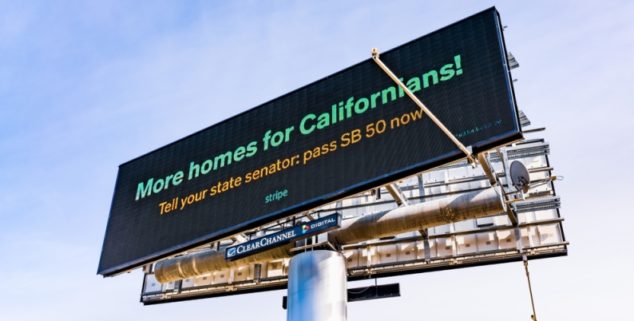News
Housing dispute gears back up over key bill
 A billboard urging approval for SB 50 in Santa Clara. (Photo: Sundry Photography, via Shutterstock)
A billboard urging approval for SB 50 in Santa Clara. (Photo: Sundry Photography, via Shutterstock)Moments after the state Senate failed to pass SB 50, a bill that would have relaxed zoning laws to combat the state’s housing crisis, Senate President Pro Tem Toni Atkins vowed to pass housing legislation this year.
“I want to personally commit to each and every one of you, to the people of California, that a housing production bill to help alleviate our housing crisis will happen this year,” she said.
Many of the bill’s opponents in the Senate came from the L.A. area, with only one area senator voting yes.
But after three attempts — and three failures — to get SB 50 to the governor’s desk, the outlook remains uncertain.
Atkins had been a crucial supporter of the bill, having redirected it from a committee where it stalled last year, bringing it to a vote before the Jan. 31 deadline. It failed then — as it had earlier — three votes shy of the 21-vote majority needed in the 40-member upper house.
Despite her efforts, the two-year bill authored by state Sen. Scott Wiener, a San Francisco Democrat, ultimately failed to pass for the third time.
Many of the bill’s opponents in the Senate came from the L.A. area, with only one area senator voting yes. The bill also faced large opposition from local governments that feared the law would take away control over development in their own cities.
According to a 2015 report by the Legislative Analyst’s Office, not enough housing exists in areas where people want to live.
Wiener, who introduced the original bill, had introduced amendments that would have given cities an additional two years to determine their own way to implement the legislation to address these concerns.
Other opponents advocated for low-income Californians, saying that the legislation would lead to luxury housing development and gentrification.
In a letter addressed to the Senate, Assembly and Gov. Newsom, California tenant groups wrote, “SB 50, even in its third iteration, signals more rent hikes, gentrification and displacement in marginalized communities and beyond.”
Supporters of the bill lauded it as a necessary step towards the additional housing needed in the state, which has been facing a housing shortage since about 1970.
According to a 2015 report by the Legislative Analyst’s Office, not enough housing exists in areas where people want to live, increasing competition and therefore house and rent prices.
“California’s housing affordability crisis demands our state pass a historic housing production bill.” — Gavin Newsom
The average cost of a California home is two-and-a-half times the national average, and the average rent price in California is 50% higher than the rest of the country.
Wiener said that “SB 50 addresses this crisis head-on by requiring cities to allow more housing and by focusing that housing near jobs and public transportation, instead of building more and more unsustainable sprawl.”
His measure would have allowed more construction of multi-family housing units in places that are currently only zones for single-family homes. Building more housing near public transportation in order to decrease pollution brought a number of environmental groups to support the bill.
Since taking office, Gov. Newsom has been vocal about the housing crisis and responded to the recent Senate vote, saying “California’s housing affordability crisis demands our state pass a historic housing production bill.”
Meanwhile, Wiener announced that he had introduced two placeholder bills and Atkins announced that she would be meeting with various interests in the coming weeks “to find a way forward on a housing production bill that can pass both houses and get the Governor’s signature.”
Want to see more stories like this? Sign up for The Roundup, the free daily newsletter about California politics from the editors of Capitol Weekly. Stay up to date on the news you need to know.
Sign up below, then look for a confirmation email in your inbox.

Leave a Reply